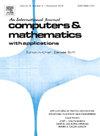Robust finite element solvers for distributed hyperbolic optimal control problems
IF 2.9
2区 数学
Q1 MATHEMATICS, APPLIED
引用次数: 0
Abstract
We propose, analyze, and test new robust iterative solvers for systems of linear algebraic equations arising from the space-time finite element discretization of reduced optimality systems defining the approximate solution of hyperbolic distributed, tracking-type optimal control problems with both the standard分布式双曲型最优控制问题的鲁棒有限元求解方法
我们提出,分析,并测试了新的鲁棒迭代求解器,用于线性代数方程组,这些方程组由简化最优性系统的时空有限元离散产生,定义了双曲分布的近似解,跟踪型最优控制问题具有标准L2和更一般的能量正则化。与通常的时间步进方法不同,我们采用在完全非结构简单网格上定义的时空连续分段线性有限元基函数来离散最优性系统。如果我们的目标是通过计算的有限元状态yϱh逼近给定的期望状态yd,那么正则化参数ϱ的最优选择将分别通过L2和能量正则化的ϱ=h4和ϱ=h2关系与时空有限元网格尺寸h联系起来。在这种情况下,我们可以为简化的有限元最优性系统构建鲁棒(并行)迭代求解器。这些结果可以推广到适应网格尺寸局部行为的可变正则化参数,这些参数在自适应网格细化的情况下可能会发生很大变化。数值结果有力地证明了理论结论。
本文章由计算机程序翻译,如有差异,请以英文原文为准。
求助全文
约1分钟内获得全文
求助全文
来源期刊

Computers & Mathematics with Applications
工程技术-计算机:跨学科应用
CiteScore
5.10
自引率
10.30%
发文量
396
审稿时长
9.9 weeks
期刊介绍:
Computers & Mathematics with Applications provides a medium of exchange for those engaged in fields contributing to building successful simulations for science and engineering using Partial Differential Equations (PDEs).
 求助内容:
求助内容: 应助结果提醒方式:
应助结果提醒方式:


